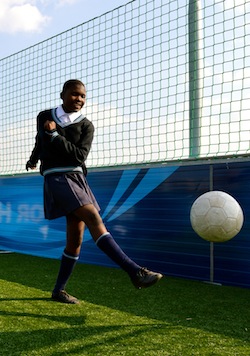 Grassroot Soccer is excited to share our most recent research publication, which investigates one of our programs for adolescent girls in South Africa. The article “Using soccer to build confidence and increase HCT uptake among adolescent girls: a mixed-methods study of an HIV prevention programme in South Africa” was published in Sport in Society, 2015. Read the article here.
Grassroot Soccer is excited to share our most recent research publication, which investigates one of our programs for adolescent girls in South Africa. The article “Using soccer to build confidence and increase HCT uptake among adolescent girls: a mixed-methods study of an HIV prevention programme in South Africa” was published in Sport in Society, 2015. Read the article here.
At Grassroot Soccer, we think it is critical to have a meaningful vision for how we use sport as a means to promote the transformation of inequalities that shape girls’ disproportionate HIV risk. In South Africa, HIV prevalence among girls 15-19 is eight times higher than among boys of the same age (Shisana et al, 2014.)
We advocate for engaging men and boys as partners in promoting gender equality and continue to work with diverse partners to understand our role in reshaping the social and structural factors that constrain girls from reaching their potential.
While we acknowledge that social change is complex, we hold a strong conviction that individuals and groups of adolescent girls already have the potential to transcend their own circumstances – no matter how latent or overlooked their power is. We see time and again that, given the opportunity, girls thrive. We think soccer is a powerful mechanism for creating social capital among adolescents and helping girls question the roles and expectations that shape gender. Girls can see themselves in our Coaches – young female leaders from their communities. When girls bond with our Coaches, the connection often triggers a sense of new possibilities.
Importantly, in our research, we found that of the 1,953 participants offered HIV Counseling and Testing (HCT), 68.5% tested – more than 4 times the estimated national average among this age group. All participants who tested positive were referred for support services. HCT is the gateway to a continuum of services for people living with HIV and has been shown to correspond to safer sexual behavior. We also found statistically significant improvements in HIV-related knowledge, attitudes and communication, which were attributed to the girls’ participation in GRS activities. Qualitative findings highlighted the value girls placed on coach–participant relationships and their improvements in self-efficacy to avoid HIV.
Grassroot Soccer is in the process of conducting further research to gauge the impact of its work with adolescent girls, including measuring experiences of violence as well as health and education outcomes of those girls participating in our sport programs.